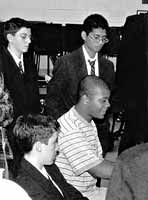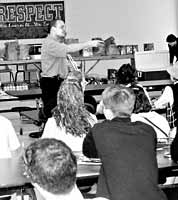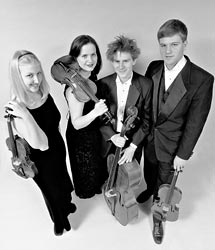Oberlin Jazz Ensemble's Recent Outreach Effort is Part of Long and Proud Tradition
by Linda Shockley
 Twenty-four
Jazz Studies students traveled to Northview High School of Sylvania,
Ohio, in May, where they served as adjudicators, clinicians and performers
for the school's 12th annual Northview Jazz Festival. The
outreach effort is just a small part of the Oberlin Jazz Ensemble's
(OJE) long and proud tradition of outreach.
Twenty-four
Jazz Studies students traveled to Northview High School of Sylvania,
Ohio, in May, where they served as adjudicators, clinicians and performers
for the school's 12th annual Northview Jazz Festival. The
outreach effort is just a small part of the Oberlin Jazz Ensemble's
(OJE) long and proud tradition of outreach.
"The OJE and smaller jazz groups," says Wendell Logan, professor of African-American music and chair of the Jazz Studies program, "have always been active in outreach at schools, prisons and festivals. This tradition ties in with the Excellence in Music program, a cooperative venture among Oberlin, the Tri-C Jazz Fest, Cuyahoga Community College and Cleveland School of the Arts. Oberlin was a founding partner in the Excellence in Music program and we have been instrumental in its growth."
Logan continues, "At Northview High School, our students did as they usually do: they represented Oberlin very well. They know what's expected of them and they do it well. I say it boastfully but it's also what other people say."
Indeed, Eugene Bohland, director of bands at Sylvania Northview High School, says of Oberlin's contribution to the festival, "Without the contribution of the Oberlin students, our 12th annual Jazz Festival would not have achieved such a high level of success. Thirteen high school bands - mostly big bands but also a few small ensembles - from Ohio and Michigan participated in the festival. The Oberlin students listened to performances, identified outstanding soloists, critiqued performances, offered tips in sectionals, and offered their own performance in the evening. They did a great job of providing our students with information and encouragement. On top of that, their performance was hot!
 I
also have a senior Rob Schwartz who was recently accepted into the Oberlin
Jazz Studies program and he was able to talk to members of OJE."
I
also have a senior Rob Schwartz who was recently accepted into the Oberlin
Jazz Studies program and he was able to talk to members of OJE."
Logan adds, "For those Jazz students who want to be teachers, this outreach work provides a wonderful opportunity for valuable classroom and teaching experience. Outreach is time consuming. But if you can go and encourage one kid to be a musician, it's worthwhile. Most of us started in school music programs; I know I did. It's important to give back."
"I think one of the primary challenges for us as adjudicators," says Michael Reavey, third-year double degree trumpet major, "is that the level of jazz education in public schools varies a great deal from state-to-state and area-to-area. We all went in with different expectations and we had to reach a middle ground. Personally, I looked for the qualities that make a successful ensemble: 'togetherness,' intonation, and a spirit or energy.
"I thought it was wonderful," Reavey adds. "I compared this experience with what I grew up with. It was great that all the groups seemed to be led by someone who knows and loves jazz education, which I think is a new development in public schools."
 "When
our students act as judges," says Logan, "the roles are reversed for
them as they are usually being judged in competitions and festivals.
This provided important experience in learning the procedures of a festival
and in recognizing and articulating exceptional musicianship."
"When
our students act as judges," says Logan, "the roles are reversed for
them as they are usually being judged in competitions and festivals.
This provided important experience in learning the procedures of a festival
and in recognizing and articulating exceptional musicianship."
The Oberlin group also performed a concert, a preview of sorts for the upcoming May 6 OJE concert in Finney Chapel. The recital included: And That's That (Dennis Mackrel), The Quintessence (Quincy Jones), The End of a Love Affair (Edward Redding), Central Park North (Thad Jones) and A Night in Tunisia (Dizzy Gillespie).
The
Enesco String Quartet:
Taking It On the Road for Winter Term
by Claire Chase '00
For many Conservatory students, Winter Term serves as a respite from the hustle of fall and spring semesters. For others, this month-long session allows for intensive practice, language study, travel or the pursuit of extracurricular projects. For a few others, Winter Term is seized as an opportunity to create ambitious career-directed projects, such as the outreach undertaking of the Enesco String Quartet, which was formed in October 1999.
For Winter Term
2000, the quartet - composed of violinist Emily Fowler '01 (Calgary,
Alberta, Canada), violinist Beth Weisser '03 (Fargo, North Dakota),
violist Adam Meyer '02 (West Des Moines, Iowa) and cellist Chris Gross
'04 (Clive, Iowa) - embarked on an extensive outreach project in communities
of North Dakota, Iowa and Minnesota. 
The ensemble dedicated Winter Term to the promotion, performance and expansion of classical music in these communities, by offering traditional recitals, interactive performances, lecture-demonstrations, discussions, master classes and Q&A sessions in local schools and community venues. The quartet visited grade schools in Fargo, Moorhead and Des Moines, offered noon-hour bag lunch recitals at the Fargo Art Museum, and presented performance-lectures at local nursing homes and community centers. Evenings were devoted to concerts in various locales, from churches to school auditoriums, including three formal recitals in Fargo, the Twin Cities and Des Moines.
"We worked in the schools and communities from 8 a.m. to 2 p.m. each day. Then we had time for a few hours of rehearsal. The schedule was rigorous but very gratifying," says Weisser.
The repertoire - including the Shostakovich String Quartet No. 8; Smetana's Quartet 'From My Life'; Mozart's Quartet K. 465 'Dissonance'; and shorter programmatic works by Gershwin and the Turtle Island String Quartet - was selected for its "extra-musical content," to make it more accessible to a wider audience, say ensemble members.
Meyer says, "Our goal for this project was to spread the message of classical music, and specifically chamber music, to people who don't normally have the benefit of exposure to such music on a conservatory level."
Weisser explains, "We also hoped to dispel several common stereotypes surrounding classical music: that classical music is boring, that classical music is for a higher echelon of society, or that classical music is stuffy. We think classical music is for everyone."
On her first week back from the project, Fowler reflected, "This was a wonderful month, so much more valuable both personally and professionally than I could have ever anticipated. It was more than just learning to play with kids, more than giving concerts and perfecting a program. This project was our brainchild. We did everything, from publicity to curriculum-designing to concert-booking. It was an incredible learning experience."
Gross concludes, "This was one of the most intense experiences of my life...We as young musicians have to make it our responsibility to continue to develop new audiences to ensure that in 50 years there will be people who want to listen to classical music!"
